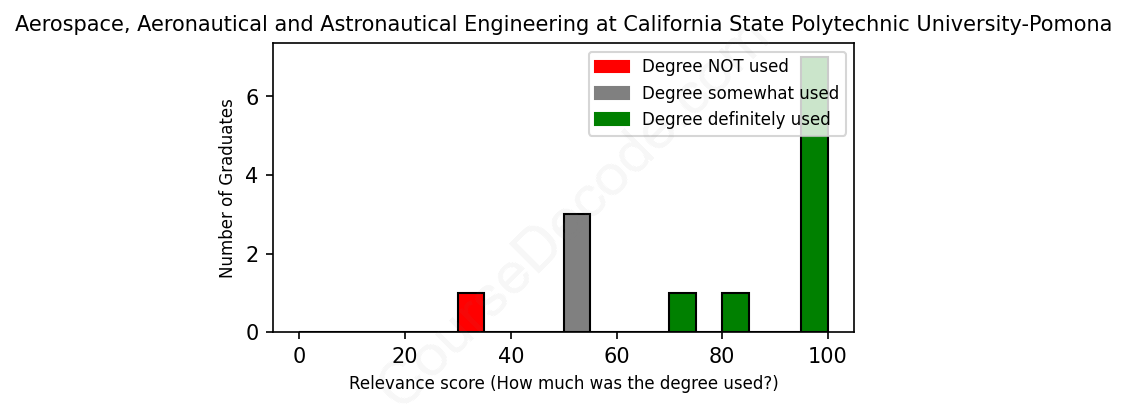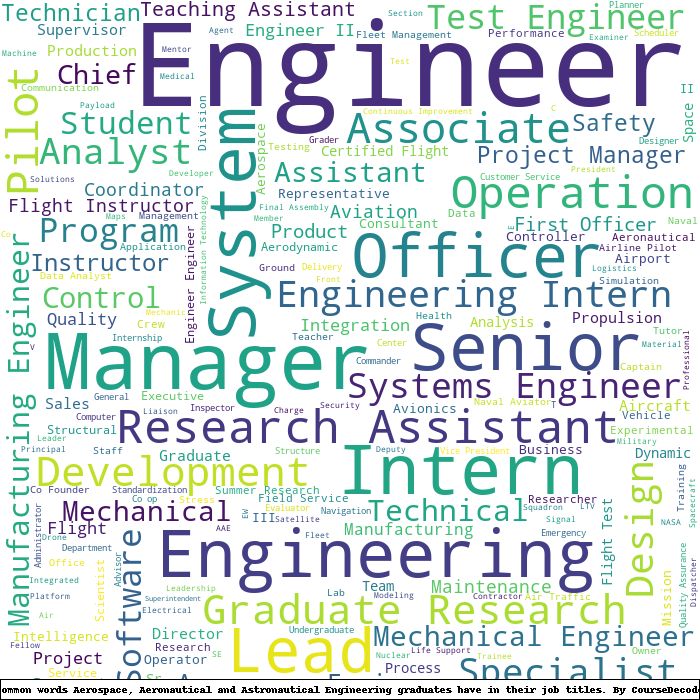
First, some facts. Of the Aerospace, Aeronautical and Astronautical Engineering graduates from California State Polytechnic University-Pomona we've analyzed , here's how many have used (or NOT used) their degree in their career:

These are estimates based on AI analysis of 13 LinkedIn profiles (see below).
The verdict? Significantly above average. Overall, with an average relevance score of 79%, Aerospace, Aeronautical and Astronautical Engineering graduates from California State Polytechnic University-Pomona have a much higher likelihood (+12%) of finding work in this field compared to the average graduate across all fields:
And for comparison, here's the chart for all profiles we've looked at across all degrees.
Also, after graduating, only 30% of these graduates have pursued further education other than another Bachelor's degree (such as a Masters degree or other), compared to the average across all profiles of 35%. This suggests a Bachelors degree is enough for most Aerospace, Aeronautical and Astronautical Engineering graduates, and it's normal to look for work straight after graduation.
See the details:
|
Relevance score: 100% We think this person has gone into a career highly relevant to their degree. We think this person has gone into a career highly relevant to their degree.
DEGREE INFOGraduated in 2020 from California State Polytechnic University-Pomona with a Bachelor of Science - BS in Aerospace, Aeronautical and Astronautical Engineering. No other secondary education since. JOB HISTORY SINCE GRADUATIONGeneral Engineer United States Space Force May 2021 - Dec 2022 Test and Evaluation Engineer  Apex Systems Jan 2023 - Jan 2024 Test and Evaluation Engineer  Boeing Jan 2024 - Present ABOUTEngineer with over 3+ years of proven experience in advanced technology engineering, bus and payload spacecraft testing, and project management. Managed the technical baseline of systems acquisitions providing critical satellite communications, advanced CubeSat, and electric propulsion technologies. |
The top 10 most common jobs done by the graduates we've analyzed (ranked most common to least) are:
People who graduated with a degree in Aerospace, Aeronautical, and Astronautical Engineering from California State Polytechnic University-Pomona have pursued a mix of positions, with varying degrees of relevance to their field of study. A significant number have found roles within major companies like Northrop Grumman, Lockheed Martin, and Boeing. These positions typically include roles such as Systems Engineer, Aerospace Engineer, and Mechanical Engineer, all of which heavily rely on the technical knowledge and skills gained from their degree. It seems that these graduates tend to gravitate towards jobs that directly apply their specialized knowledge, particularly in system design and engineering, testing, and analysis.
However, not all job titles are directly relevant to aviation or aerospace. Some individuals have taken on roles like Quality Assurance or Project Engineer, where the focus shifts more towards general engineering or management rather than specific aerospace applications. There are also cases where people's jobs have little to no connection to aerospace, such as those involved in wildlife initiatives or service roles in the Navy. Overall, while many graduates are successfully securing roles that align well with their aerospace education, there’s a noticeable mix, where some end up in positions that leverage their engineering background only to a limited extent.
Here is a visual representation of the most common words in job titles for Aerospace, Aeronautical and Astronautical Engineering graduates (this is across all Aerospace, Aeronautical and Astronautical Engineering graduates we've analyzed, not just those who went to California State Polytechnic University-Pomona):

Based on the LinkedIn profiles from graduates of California State Polytechnic University-Pomona with degrees in Aerospace, Aeronautical, and Astronautical Engineering, it looks like these folks are off to a solid start in their careers. For many of them, their first jobs post-graduation are pretty relevant to the aerospace field. Common entry-level positions include roles like Quality Assurance Engineer, Systems Test Engineer, and various engineering positions at major companies like Lockheed Martin, Northrop Grumman, and the U.S. military. It's clear that these graduates are stepping into positions that align closely with their studies, which bodes well for their career trajectories.
If we look five to ten years down the line, it seems like a good number of these professionals stay within the aerospace and defense industry, often climbing the ranks and taking on more advanced engineering roles. Many have progressed into senior engineering positions, while others have taken on managerial responsibilities or even entrepreneurial paths, like starting their own companies. Overall, it appears that graduates from this program are finding success and relevance in their chosen careers, suggesting that a degree in Aerospace, Aeronautical, and Astronautical Engineering from Cal Poly Pomona is a great stepping stone to exciting and meaningful work in this field.
Honestly, getting a Bachelor’s degree in Aerospace, Aeronautical, and Astronautical Engineering can be pretty challenging, and Cal Poly Pomona is no exception. This program usually involves a hefty load of math and physics, plus a good amount of hands-on projects and labs, which makes it really engaging but also quite demanding. You'll have to be ready to tackle complex concepts and solve problems regularly, and the coursework can be intense at times. While it’s tough, if you enjoy the subject and are willing to put in the effort, it can definitely be rewarding! Just be prepared for those late nights of studying and group projects.
Most commonly, in the LinkedIn profiles we've looked at, it takes people 4 years to finish a Bachelor degree in Aerospace, Aeronautical and Astronautical Engineering.
Looking at these graduates from Cal Poly Pomona, it seems like they’ve landed some solid jobs in the aerospace field, which generally pays pretty well, especially for engineers. The earlier grads have solid roles that usually come with decent salaries—like working at places like Lockheed Martin and Northrop Grumman—both known for good pay and benefits. Even the younger ones starting out seem to be on the right path with internships and roles at big names in the industry. Some are even moving up the ranks quickly, which usually means fatter paychecks down the line. Overall, it looks like most of these folks are making decent money and setting themselves up for success in their careers!
Here is a visual representation of the most common words seen in the "about" section of LinkedIn profiles who have a Bachelor degree in Aerospace, Aeronautical and Astronautical Engineering (this is across all Aerospace, Aeronautical and Astronautical Engineering graduates we've analyzed, not just those who went to California State Polytechnic University-Pomona). This may or may not be useful:

Here are all colleges offering a Bachelor degree in Aerospace, Aeronautical and Astronautical Engineering (ordered by the average relevance score of their Aerospace, Aeronautical and Astronautical Engineering graduates, best to worst) where we have analyzed at least 10 of their graduates:
| College | Score | Count |
|---|---|---|
 Texas A&M University Texas A&M University
|
87 | 22 |
 California Polytechnic State University-San Luis Obispo California Polytechnic State University-San Luis Obispo
|
86 | 12 |
 University of Cincinnati University of Cincinnati
|
86 | 10 |
 Purdue University Purdue University
|
85 | 40 |
 Rensselaer Polytechnic Institute Rensselaer Polytechnic Institute
|
85 | 17 |
 Georgia Institute of Technology Georgia Institute of Technology
|
84 | 23 |
 Liberty University Liberty University
|
81 | 21 |
 Iowa State University Iowa State University
|
80 | 16 |
 University of Colorado Boulder University of Colorado Boulder
|
80 | 13 |
 California State Polytechnic University-Pomona California State Polytechnic University-Pomona
|
79 | 13 |
 United States Naval Academy United States Naval Academy
|
77 | 12 |
 The Ohio State University The Ohio State University
|
76 | 20 |
 University of Central Florida University of Central Florida
|
75 | 25 |
 Arizona State University Arizona State University
|
74 | 12 |
 University of Michigan University of Michigan
|
74 | 10 |
 Embry-Riddle Aeronautical University Embry-Riddle Aeronautical University
|
71 | 163 |
 Penn State University Penn State University
|
68 | 12 |
 Florida Institute of Technology Florida Institute of Technology
|
67 | 20 |
 The University of Alabama in Huntsville The University of Alabama in Huntsville
|
67 | 11 |
 Embry Riddle Aeronautical University-Worldwide Embry Riddle Aeronautical University-Worldwide
|
66 | 10 |
 University of Illinois at Urbana-Champaign University of Illinois at Urbana-Champaign
|
48 | 10 |